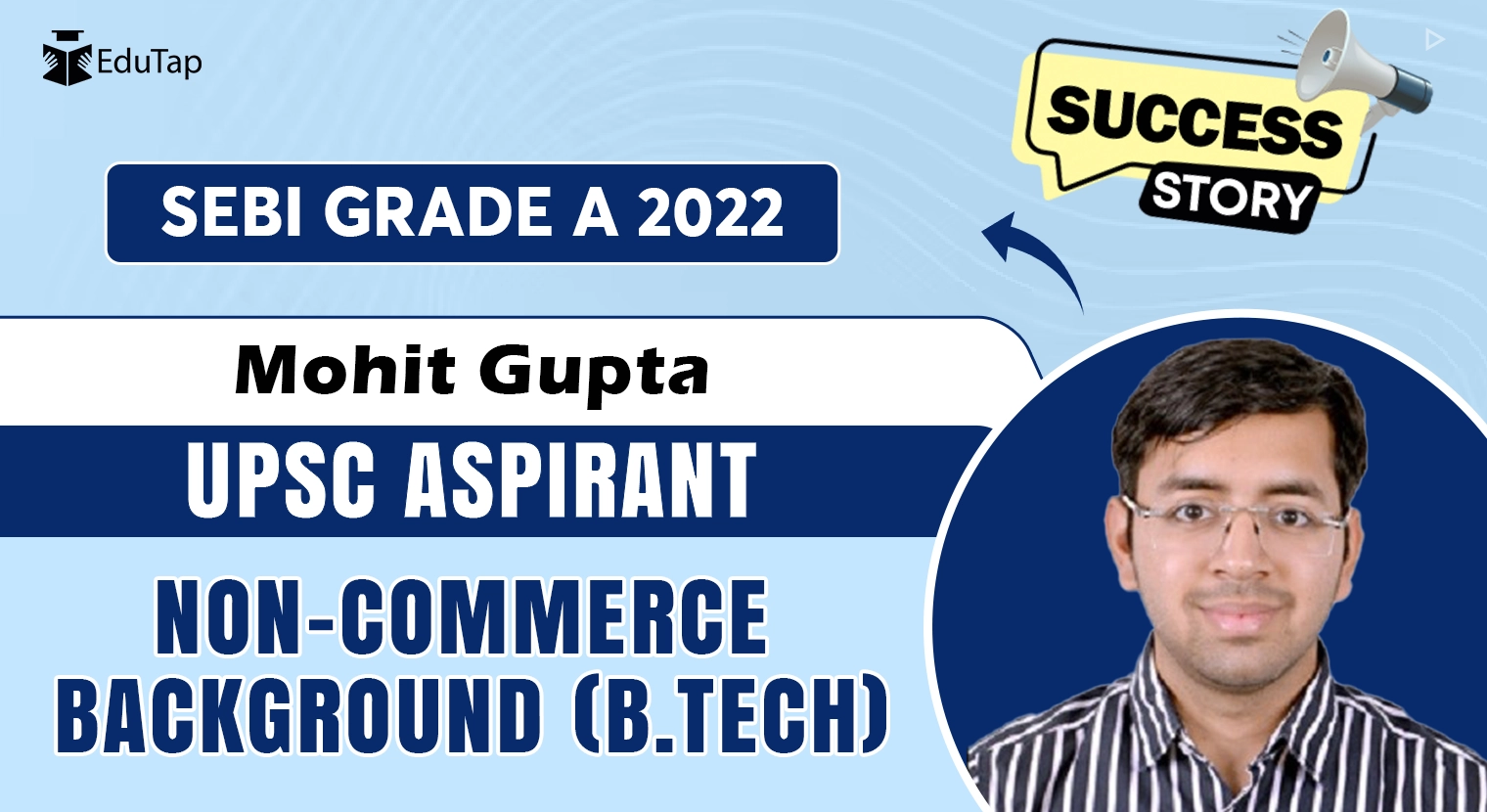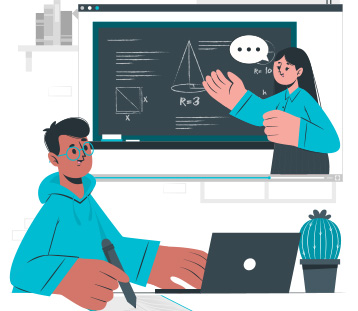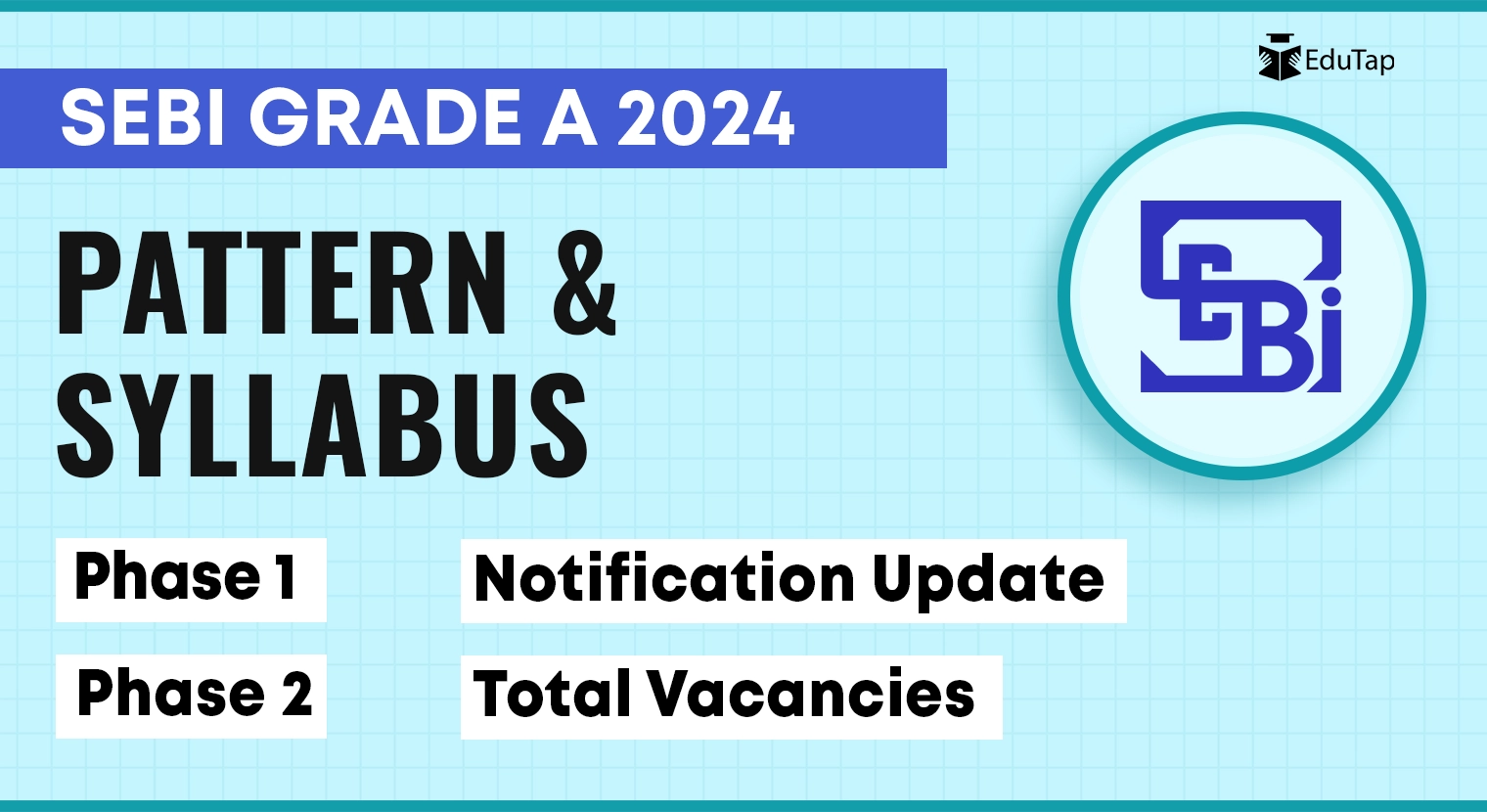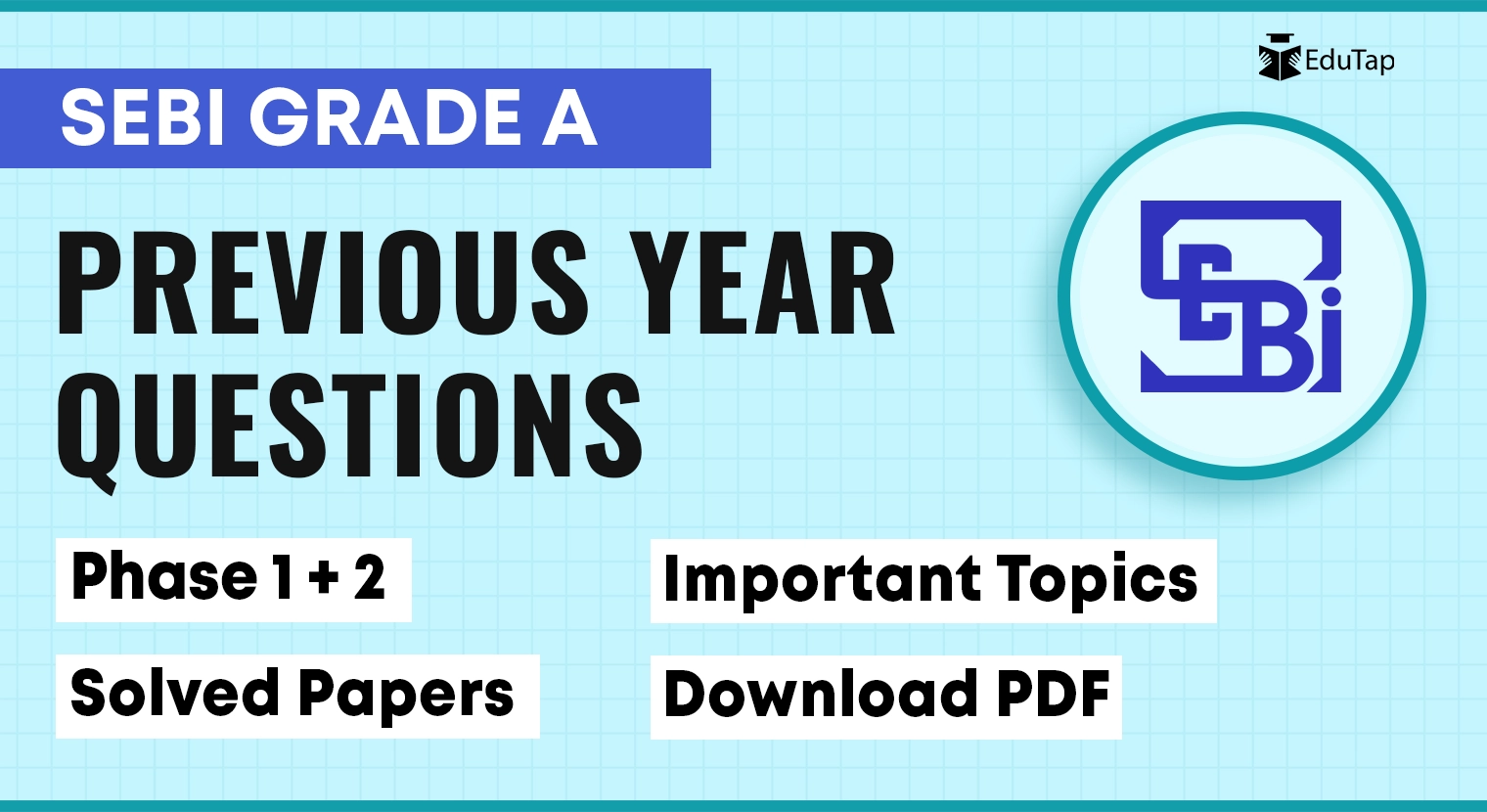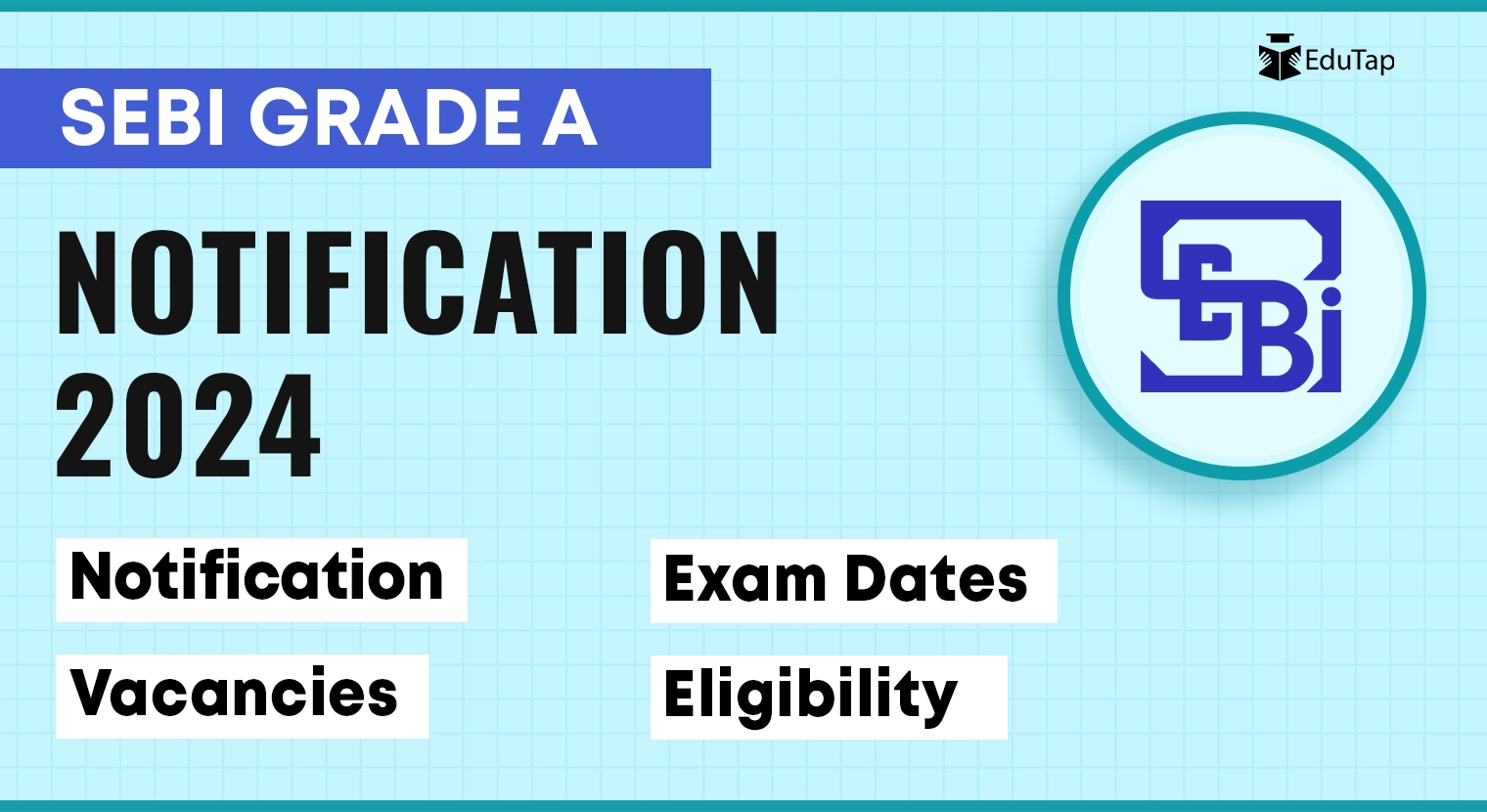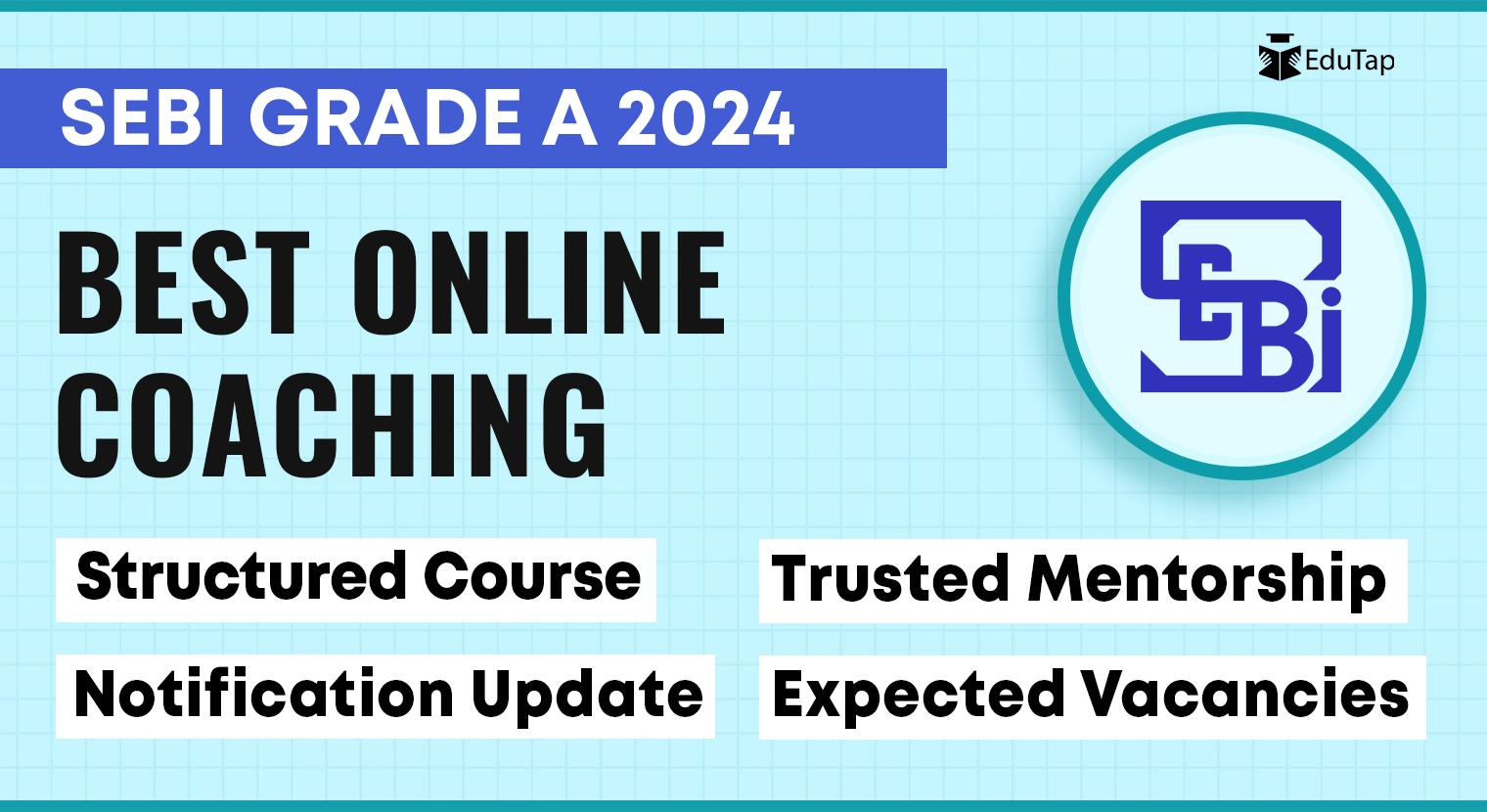Mohit Gupta, a graduate of YMCA College in Faridabad, completed his B.Tech in Mechanical Engineering in the year 2017. Post his graduation, Mohit decided to prepare for competitive exams, targeting UPSC and RBI Grade B exams before SEBI Grade A. His academic foundation in mechanical engineering laid the groundwork for his analytical skills and logical thinking, essential skills for competitive exams.
Let’s delve into his preparation strategy for both Phase 1 and Phase 2 of the SEBI Grade A exam, along with valuable insights from his interview experience.
SEBI Grade A Phase 1: Preparation Strategy
In the initial phase of his SEBI Grade A preparation, Mohit followed a practical strategy based on his strengths and weaknesses for Paper 1, taking on test series directly.
Quantitative Aptitude
- Took advantage of previous banking exam preparation, particularly RBI Grade B, and engineering background to build a strong foundation in quantitative aptitude.
- Mohit was able to identify his weakness of calculation speed and focused on enhancing it through learning basic maths formulas and tricks for multiplication and division.
Reasoning Ability
- Practiced extensively through mock tests to identify areas of weakness and enhance speed and accuracy in solving questions.
- Recognized the importance of consistent practice and avoided overconfidence, understanding the significance of meeting the sectional cutoff rather than aiming for a full score.
General Awareness
- As a UPSC aspirant, he was always reading newspapers such as The Indian Express.
- However, he took up factual news coverage relevant to SEBI Grade A, and believes that 3-4 months of current affairs is sufficient for preparation.
Mohit’s past experience in exams such as RBI Grade B and UPSC helped ease the preparation of Quant, Reasoning and English drastically. Let’s look at his strategy for Paper 2, considering he had no foundation in subjects such as Costing and Accounts as an engineer.
Finance
- He understood that it was important as an engineer to develop a thorough foundation of finance concepts.
- Utilized NISM booklet on Securities Market Foundation to deepen understanding of derivatives, capital, money markets, and other technical concepts.
- Resorted to various online resources and notes to grasp concepts like time value of money, bonds, primary and secondary markets.
Management
- Utilized knowledge from previous examinations, such as RBI Grade B, and studied via the Organizational Behavior book, complementing the exam syllabus with available resources.
- Further developed understanding with online resources to cover topics not covered in available materials.
Companies Law
- Initially, he tried to study directly from bare acts, but soon realized the complexity and time-consuming nature of his approach.
- He thought he should learn every article, penalty, and provisions, for every act in one-go, but realized that note making and consistent revision are key for this subject.
- He took assistance from his brother who was experienced in company law to understand concepts and clarify doubts.
- He supported his learning with online resources, including YouTube tutorials and websites, to gain comprehensive understanding of sections, penalties, and regulations.
He made digital notes at every step to revise later, as he could update them multiple times.
Costing
- As a fresher in the subject, he understood he will have to study costing concepts from scratch, particularly standard costing and related variances.
- Referenced ICI booklets for Cost and Management Accounting to build a foundational understanding.
- Complemented study with online tutorials and resources, particularly for complex topics like marginal costing and batch costing.
Economics
- He benefitted from his prior knowledge from UPSC syllabus but recognized the need for deeper study to meet SEBI Grade A exam standards.
- According to him, the SEBI Grade A exam required a more technical understanding of concepts, unlike UPSC surface-level study.
- Utilized online resources extensively, focusing on understanding complex concepts like IS-LM curve, consumption function, and multiplier effect.
Commerce and Accounts
- Started from scratch, understanding that he had no prior knowledge in accounting principles and practices.
- Even simple concepts of Credit and Debit for him were limited to bank statements.
- He started to develop a base from basic concepts of journal entries, debits, and credits, gradually progressing to more advanced topics.
- Utilized 11th and 12th NCERT textbooks and reference materials recommended by his brother, and also online resources and notes for thorough understanding of accounting standards and regulations.
During his final exam, Mohit felt the exam pressure and emphasizes today how the SEBI Grade A exam is not a cakewalk and requires dedication, hard work, and a strong mindset. He consistently emphasizes the importance of revision to remember everything that is studied.

Let’s now look at his Phase 2 preparation strategy.
Phase 2: Preparation Strategy
For Phase 2, especially Paper 1, Mohit focused on being thorough with the format and structure, as he already had a habit of writing every day.
Descriptive English
- Mohit had an interest in writing and did the same every day, developing a good speed. He also had experience from RBI Grade B and UPSC.
- He focused on precision and accuracy in writing, particularly in sections like precis, where following rules and guidelines was crucial.
- He acknowledges that the interface can be problematic, however good practice over the keyboard can help one feel comfortable during the final exam.
After seeing the difficulty level of Phase 1, Mohit prepared for a difficult Phase 2 exam as well. He focused on covering every topic in the syllabus, especially focusing on the numericals. However, he believes that if one practices, then the difficulty level of the exam can be cracked with confidence.
He attended EduTap’s YouTube videos that were released before Phase 2 exam and practiced everyday.
Finance
- Revised all topics comprehensively, focusing on both conceptual understanding and numerical proficiency.
- Utilized resources such as standard textbooks, online videos, and Edutap’s question-solving sessions to fill knowledge gaps and strengthen conceptual understanding.
- Paid special attention to complex numericals, ensuring familiarity with various scenarios and calculations.
If a numerical takes time, one should either mark it for review or skip it and later come back to it, if they have time left. It is very important to keep an eye on the clock.
Management
- Revised core management concepts from standard textbooks, emphasizing clarity and depth of understanding.
- Practiced decoding questions to extract core concepts/keywords effectively. This helps one be accurate with their answers.
- Leveraged online resources for additional practice and exposure to diverse question formats.
Companies Law
- Implemented a consistent revision strategy, ensuring a thorough understanding of legal provisions and concepts.
- Adopted a strategy of quickly selecting answers to direct questions, maximizing efficiency and time management. He emphasized that Company Law is a section where one can save time.
Commerce and Accounts
- He had to skip a few questions in the Commerce section due to either being lengthy or him running short on time.
- Adopted a balanced approach, attempting manageable questions while marking challenging and lengthy questions for later review.
Mohit strongly emphasized on the importance of maximizing efficiency while navigating through lengthy and challenging questions.
Costing
- Identified and addressed knowledge gaps based on his Phase 1 performance, particularly in areas of prime cost, types of costs, and variance analysis.
- He also focused on conceptual clarity and proficiency in numerical problem-solving and strengthening formula retention.
Economics
- He emphasized that aspirants need to focus on syllabus keywords. For example, he studied technical concepts such as IS-LM curves, consumption functions, and supply functions in-depth and not just surface level.
- Ensured a thorough understanding of core economic models and their practical implications.
- Leveraged keyword-based study approach to extract key concepts and nuances effectively.
The SEBI Grade A exam was a new territory for him. Once he cleared Phase 2, he was immensely proud of his achievement. However, Mohit had never had a good interview experience in the past. Based on that, he leveraged mock interviews to prepare smartly this time.
Interview Preparation Strategy
Mohit’s interview preparation for the SEBI Grade A examination included focused on both technical and HR aspects. Here’s an overview of his preparation and experience during the interview.
Preparation
- Identified key areas of preparation, including technical knowledge of capital markets and HR-related questions based on available transcripts.
- Revised technical concepts from NISM booklets and ensured conceptual clarity in areas such as depository structure, mutual funds, and capital market regulations.
- Prepared responses to HR questions, including strengths, weaknesses, career motivations, and gap year explanations.
- He also prepared questions such as why SEBI, how will his education benefit SEBI, etc.
He adopted a calm and composed mindset on the day of the interview, focusing on appearance (for example, is his tie okay, is the collar pressed, etc.) and maintaining a positive outlook.
Interview Experience
- Mohit entered the interview hall confidently, greeting all panel members with a smile.
- Initial questions focused on his background, including his experience with UPSC preparation and his transition to SEBI from a non-finance background.
- Panel members questioned Mohit on his motivations for choosing SEBI, inquired about his department preferences, and sought explanations for career choices and gap years.
- Mohit answered all HR questions with ease, drawing on his prepared responses to confidently present his strengths, weaknesses, and career aspirations.
- The interview also included technical questions on topics such as inflation (for example, why is inflation so high at the moment, what is the government doing about it, can RBI do anything about it, and so on).
- Overall, the interview leaned more towards HR-oriented questions, allowing Mohit to benefit from his prepared responses.
Mohit’s ability to remain composed, articulate his thoughts clearly, and confidently approach the panel reflects his thorough preparation and readiness to excel in challenging situations.
Fun Fact:
As an engineering graduate, during his SEBI Grade A journey, Accounts became the most loved Subject by Mohit. And throughout his journey, Anchit Sir at EduTap became a favorite mentor!
You can listen to Mohit’s journey in his own words in the following video.
Message for Aspirants
Concluding Mohit’s journey, here are a few parting words of advice he shared for aspirants preparing to embark on their SEBI Grade A journey:
- Tailor Your Preparation: Recognize your strengths and weaknesses, and build your preparation strategy accordingly. What worked for Mohit may not necessarily work for everyone.
- Start Early: Don’t wait for the official notification to start your preparation. Especially if you come from a non-commerce background, understanding the concepts early on is important.
- Believe in Yourself: Amidst the fierce competition, maintain faith in your abilities. Confidence and self-belief are essential in this journey.
- Take it Step by Step: Break down the exam process and syllabus into manageable stages. Focus on conquering each phase one at a time, starting with Phase 1 and then progressing to Phase 2.
Remember, success in the SEBI Grade A examination is achievable only with diligent preparation and a strong mindset. Stay committed to your goals, and with hard work, you can overcome any obstacle that comes your way.
